What Japanese history lessons leave out
- Published
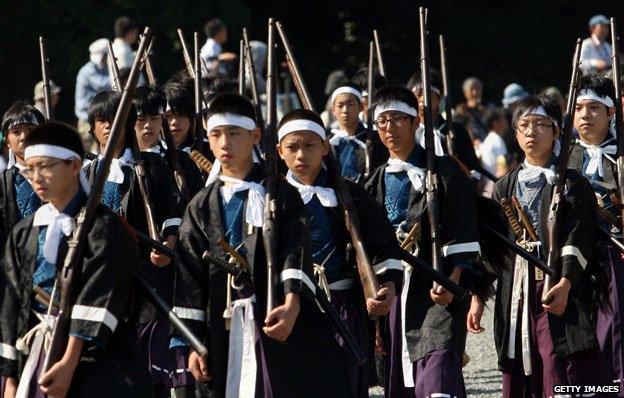
Japanese people often fail to understand why neighbouring countries harbour a grudge over events that happened in the 1930s and 40s. The reason, in many cases, is that they barely learned any 20th Century history. I myself only got a full picture when I left Japan and went to school in Australia.
From Homo erectus to the present day - more than a million years of history in just one year of lessons. That is how, at the age of 14, I first learned of Japan's relations with the outside world.
For three hours a week - 105 hours over the year - we edged towards the 20th Century.
It's hardly surprising that some classes, in some schools, never get there, and are told by teachers to finish the book in their spare time.
When I returned recently to my old school, Sacred Heart in Tokyo, teachers told me they often have to start hurrying, near the end of the year, to make sure they have time for World War II.
"When I joined Sacred Heart as a teacher, I was asked by the principal to make sure that I teach all the way up to modern history," says my history teacher from Year Eight.
"We have strong ties with our sister schools in the Asian region so we want our students to understand Japan's historical relationship with our neighbouring countries."
I still remember her telling the class, 17 years ago, about the importance of Japan's war history and making the point that many of today's geopolitical tensions stem from what happened then.
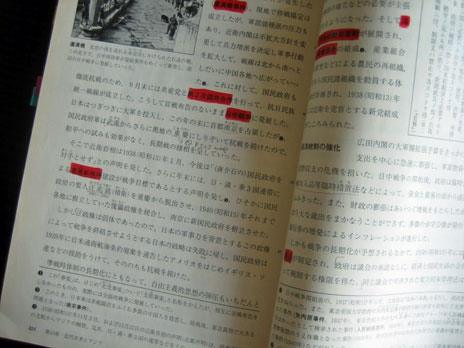
Mariko's Japanese textbook: Only a footnote on the Nanjing massacre
I also remember wondering why we couldn't go straight to that period if it was so important, instead of wasting time on the Pleistocene epoch.
When we did finally get there, it turned out only 19 of the book's 357 pages dealt with events between 1931 and 1945.
There was one page on what is known as the Mukden incident, when Japanese soldiers blew up a railway in Manchuria in China in 1931.
There was one page on other events leading up to the Sino-Japanese war in 1937 - including one line, in a footnote, about the massacre that took place when Japanese forces invaded Nanjing - the Nanjing Massacre, or Rape of Nanjing.
There was another sentence on the Koreans and the Chinese who were brought to Japan as miners during the war, and one line, again in a footnote, on "comfort women" - a prostitution corps created by the Imperial Army of Japan.
There was also just one sentence on the atomic bombings of Hiroshima and Nagasaki.
I wanted to know more, but was not quite eager enough to delve into the subject in my spare time. As a teenager, I was more interested in fashion and boys.
My friends had a chance to choose world history as a subject in Year 11. But by that stage I had left the Japanese schooling system, and was living in Australia.
I remember the excitement when I noticed that instead of ploughing chronologically through a given period, classes would focus on a handful of crucial events in world history.
So brushing aside my teacher's objection that I would struggle with the high volume of reading and writing in English - a language I could barely converse in - I picked history as one of my subjects for the international baccalaureate.
My first ever essay in English was on the Rape of Nanjing.
There is controversy over what happened. The Chinese say 300,000 were killed and many women were gang-raped by the Japanese soldiers, but as I spent six months researching all sides of the argument, I learned that some in Japan deny the incident altogether.
Nobukatsu Fujioka is one of them and the author of one of the books that I read as part of my research.
"It was a battlefield so people were killed but there was no systematic massacre or rape," he says, when I meet him in Tokyo.
"The Chinese government hired actors and actresses, pretending to be the victims when they invited some Japanese journalists to write about them.
"All of the photographs that China uses as evidence of the massacre are fabricated because the same picture of decapitated heads, for example, has emerged as a photograph from the civil war between Kuomintang and Communist parties."
As a 17-year-old student, I was not trying to make a definitive judgement on what exactly happened, but reading a dozen books on the incident at least allowed me to understand why many people in China still feel bitter about Japan's military past.
While school pupils in Japan may read just one line on the massacre, children in China are taught in detail not just about the Rape of Nanjing but numerous other Japanese war crimes, though these accounts of the war are sometimes criticised for being overly anti-Japanese.
The same can be said about South Korea, where the education system places great emphasis on our modern history. This has resulted in very different perceptions of the same events in countries an hour's flying time apart.
One of the most contentious topics there is the comfort women.
Fujioka believes they were paid prostitutes. But Japan's neighbours, such as South Korea and Taiwan, say they were forced to work as sex slaves for the Japanese army.
Without knowing these debates, it is extremely difficult to grasp why recent territorial disputes with China or South Korea cause such an emotional reaction among our neighbours. The sheer hostility shown towards Japan by ordinary people in street demonstrations seems bewildering and even barbaric to many Japanese television viewers.
Equally, Japanese people often find it hard to grasp why politicians' visits to the controversial Yasukuni Shrine - which honours war criminals among other Japanese soldiers - cause quite so much anger.
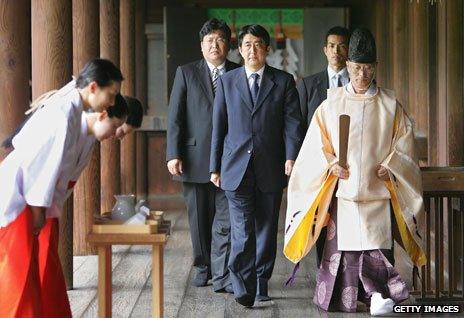
Japanese Prime Minister Shinzo Abe, visiting the Yasukuni Shrine in 2012
I asked the children of some friends and colleagues how much history they had picked up during their school years.
Twenty-year-old university student Nami Yoshida and her older sister Mai - both undergraduates studying science - say they haven't heard about comfort women.
"I've heard of the Nanjing massacre but I don't know what it's about," they both say.
"At school, we learn more about what happened a long time ago, like the samurai era," Nami adds.
Seventeen-year-old Yuki Tsukamoto says the "Mukden incident" and Japan's invasion of the Korean peninsula in the late 16th Century help to explain Japan's unpopularity in the region.
"I think it is understandable that some people are upset, because no-one wants their own country to be invaded," he says.
But he too is unaware of the plight of the comfort women.
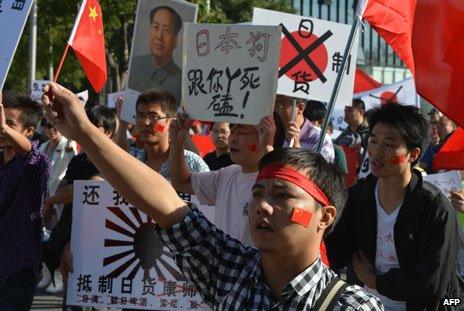
Chinese protesters often mark anniversaries of 20th Century clashes with Japan
Former history teacher and scholar Tamaki Matsuoka holds Japan's education system responsible for a number of the country's foreign relations difficulties.
"Our system has been creating young people who get annoyed by all the complaints that China and South Korea make about war atrocities because they are not taught what they are complaining about," she said.
"It is very dangerous because some of them may resort to the internet to get more information and then they start believing the nationalists' views that Japan did nothing wrong."
I first saw her work, based on interviews with Japanese soldiers who invaded Nanjing, when I visited the museum in the city a few years ago.
"There were many testimonies by the victims but I thought we needed to hear from the soldiers," she says.
"It took me many years but I interviewed 250 of them. Many initially refused to talk, but eventually, they admitted to killing, stealing and raping."
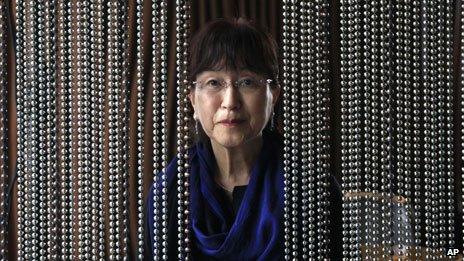
Matsuoka accuses the government of a deliberate silence about atrocities
When I saw her video interviews of the soldiers, it was not just their admission of war crimes which shocked me, it was their age. Already elderly by the time she interviewed them, many had been barely 20 at the time, and in a strange way, it humanised them.
I was choked with an extremely complex emotion. Sad to see Japan repeatedly described as evil and dubbed "the devil", and nervous because I wondered how people around me would react if they knew I was Japanese. But there was also the big question why - what drove these young soldiers to kill and rape?
When Matsuoka published her book, she received many threats from nationalist groups.
She and Fujioka represent two opposing camps in a debate about what should be taught in Japanese schools.
Fujioka and his Japanese Society for History Textbook Reform say most textbooks are "masochistic" and only teach about Japan in negative light.
"The Japanese textbook authorisation system has the so-called "neighbouring country clause" which means that textbooks have to show understanding in their treatment of historical events involving neighbouring Asian countries. It is just ridiculous," he says.
He is widely known for pressuring politicians to remove the term "comfort women" from all the junior high school textbooks. His first textbook, which won government approval in 2001, made a brief reference to the death of Chinese soldiers and civilians in Nanjing, but he plans to tone it down further in his next book.
But is ignorance the solution?
The Ministry of Education's guidelines for junior high schools state that all children must be taught about Japan's "historical relations with its Asian neighbours and the catastrophic damage caused by the World War II to humanity at large".
"That means schools have to teach about the Japanese military's increased influence and extension of its power [in the 1930s] and the prolonged war in China," says ministry spokesman Akihiko Horiuchi.
"Students learn about the extent of the damage caused by Japan in many countries during the war as well as sufferings that the Japanese people had to experience especially in Hiroshima, Nagasaki and Okinawa in order to understand the importance of international co-operation and peace.
"Based on our guideline, each school decides which specific events they focus on depending on the areas and the situation of the school and the students' maturity."
Matsuoka, however, thinks the government deliberately tries not to teach young people the details of Japan's atrocities.
Having experienced history education in two countries, the way history is taught in Japan has at least one advantage - students come away with a comprehensive understanding of when events happened, in what order.
In many ways, my schoolfriends and I were lucky. Because junior high students were all but guaranteed a place in the senior high school, not many had to go through what's often described as the "examination war".
For students who are competing to get into a good senior high school or university, the race is extremely tough and requires memorisation of hundreds of historical dates, on top of all the other subjects that have to be studied.
They have no time to dwell on a few pages of war atrocities, even if they read them in their textbooks.
All this has resulted in Japan's Asian neighbours - especially China and South Korea - accusing the country of glossing over its war atrocities.
Meanwhile, Japan's new Prime Minister Shinzo Abe criticises China's school curriculum for being too "anti-Japanese".
He, like Fujioka, wants to change how history is taught in Japan so that children can be proud of our past, and is considering revising Japan's 1993 apology over the comfort women issue, external.
If and when that happens, it will undoubtedly cause a huge stir with our Asian neighbours. And yet, many Japanese will have no clue why it is such a big deal.
You can follow the Magazine on Twitter, external and on Facebook, external